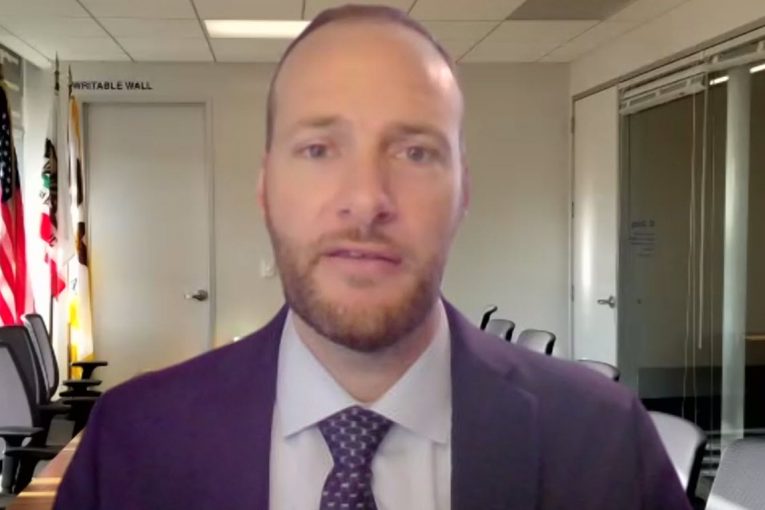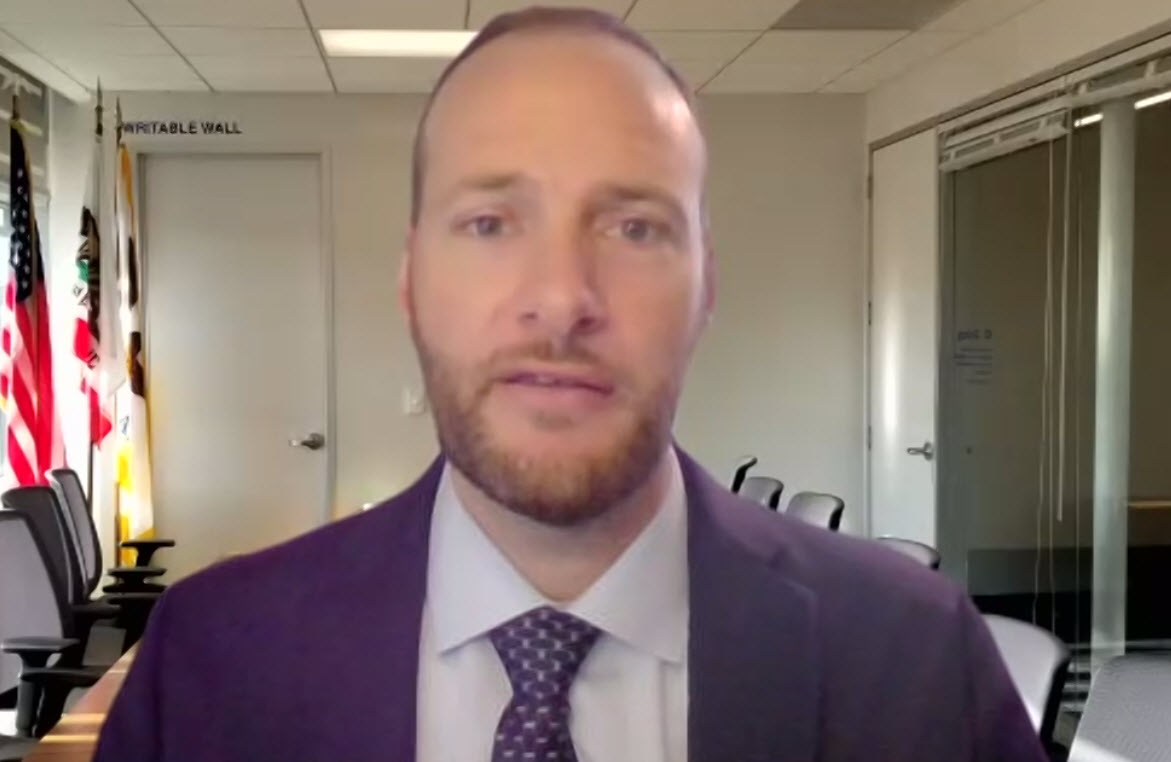

By Elina Lingappa
SAN FRANCISCO – San Francisco District Attorney Chesa Boudin joined Bernal Heights community members this week to explain and share remorse surrounding the violent incidents that occurred in the neighborhood this year.
Bernal Heights District 9 Supervisor Hillary Ronen, Captain Christopher Woon, Executive Director of Bernal Heights Neighborhood Center Gina Dacus, and DA Boudin moderated a virtual public safety meeting to address the community’s call for safety.
In a series of opening remarks, Boudin admitted that, while the DA’s office will give every case the attention it deserves, his office is currently overworked during the COVID-19 pandemic with thousands of backlogged cases.
However, Boudin’s office continues to stay vigilant and produce results, he said.
He reminded the meeting participants that overall crime in San Francisco has decreased since 2019, with about 23 percent fewer reported crimes in 2020 than in the year previous.
Nonetheless, a select few areas of crime are unusually high, including burglaries and motor vehicle theft. This trend extends nationwide and is not exclusive to San Francisco, but it remains a  prominent community concern in Bernal Heights, he said.
prominent community concern in Bernal Heights, he said.
Captain Woon spoke about the recent and most major incidents in the community, predominantly home and garage burglaries.
He underscored the importance of crime prevention strategies that the community can embrace, including installation of plexiglass and locks into their garages, and keeping up to date on what’s happening. noting
“Half the battle is getting informed on what’s going on.”
The speakers also addressed other community concerns, including recent automobile sideshows. Dacus provided background on her previous work concerning pedestrian safety.
Supervisor Ronen issued updates on the recent fire incident, and revealed the plan for supporting small businesses during reopening.
In response to a question concerning mental health crises, Ronen also gave insight into the new Street Crisis Response Teams, which are comprised of a community parametric, a peer advocate with experience in mental illness or substance abuse, and a social worker.
These groups of three respond to 911 calls concerning non-emergency and non-violent behavioral health emergencies. There are currently two teams operating, one in the Tenderloin and one in the Mission/Castro district. Depending on their success, this program may be expanded.
District Attorney Boudin also gave input concerning the recent surge in burglaries.
He made sure to note that, “we take people’s homes and the protection of the home unbelievably seriously. They are and always will be a priority for my office.”
Boudin provided a few theories on what is driving this increase.
“Absolutely, economic desperation is part of it,” he said, “the devastation of the pandemic is hard to overstate, especially for people who were already struggling.”
He pointed out that a relative decrease in auto burglaries in more tourist-driven locations during the pandemic go hand in hand with an increase in garage and home burglaries. He said these may be linked as many individuals have shifted from car to home theft with the drop in tourism.
Boudin’s Chief of Staff, David Campos, elaborated on the issue, assuring the community members that the DA’s office does everything in its power to address these cases.
Nonetheless, they face many challenges, as burglary cases are cleared at very low rates, and the pandemic has posed many difficulties to the investigative process.
The DA’s office runs a Crime Strategies Unit which is committed to analyzing these cases closely, especially those which may be involved in an organized ring.
Additionally, Campos underscored the importance and success of their community liaison program, which ensures the community’s needs are met and their hardships are addressed.
DA Boudin was then questioned about a topical issue – recidivism.
“We know that recidivism is and has been a reality in the criminal justice system,” he said, adding, “two thirds of people released from state prison across the state of California will be back incarcerated within a couple of years.”
Recidivism is attributed to a variety of factors, according to the District Attorney, including the fact that courts often don’t grant the DA’s request for detainment pretrial.
Boudin also underscored an important point – 99.9 percent of all people arrested by SFPD will be released at some point or another.
“It’s imperative that we use [the time people spend in the criminal justice system] effectively to intervene and to get at the root causes of crime so we are changing behavior,” he emphasized.
To illustrate, he brought up a very relevant case in which a man, most likely high on methamphetamine, was driving a stolen car, which resulted in the death of a young father.
This incident was offered after he had spent years in prison and had demonstrated multiple accounts of similar behavior. DA Boudin pointed to the fact that his time in prison had not been successful in intervening and changing his behavior.
Boudin said 75 percent of people put into San Francisco County jail struggle with mental illness, addiction, or both.
“We need to make sure every arrest is an opportunity for meaningful intervention that gets at the root causes of crime and changes behavior more effectively than an arbitrary number of days or months or years in prison ever could” he reiterated.
But he also reminded the community members that “we will hold people accountable.”
Boudin and his colleague Lisa Ortiz underscored their commitment to justice by highlighting his office’s robust Victims Services Division, including a rigorous advocacy program to aid crime victims.
 Elina Lingappa is a sophomore at the University of San Francisco double majoring in Sociology and Politics. She is originally from Seattle, Washington, and she is deeply passionate about the spheres of criminal justice and education equity.
Elina Lingappa is a sophomore at the University of San Francisco double majoring in Sociology and Politics. She is originally from Seattle, Washington, and she is deeply passionate about the spheres of criminal justice and education equity.
To sign up for our new newsletter – Everyday Injustice – https://tinyurl.com/yyultcf9
Support our work – to become a sustaining at $5 – $10- $25 per month hit the link:





Yeah – poverty is causing them to break into people’s homes. Probably stealing loaves of bread.
If they’re shifting their “pre-pandemic” activities (from car break-ins to home break-ins, as a result of the pandemic), how does Mr. Boudin attribute the shift of these activities to the pandemic?
On that we totally agree. I think the increase in the $ of what is considered a felony theft is more the cause of the problem than the pandemic.
Whom are you quoting KO?
It was me, but I decided to delete that.
In other words, how is this shift driven by “economic desperation, caused by the pandemic”, given that it was occurring before the pandemic, as well? (With only the possible “location” changed?)
Government people who say stuff to the public often make S up.
It’s safe to assume that his “behavior” (at least the result) would be different, if he was not released prematurely.
Seems to me that he’s making a case against what he (and others like him) generally advocate.
By the way, if you want to know what causes crime, it’s criminals.
In his world, most all are fixable, and it’s the failure of society’s paid fixers inside the walls of prison to fix them before they get out that is the problem. WE! are responsible to fix broken people’s behaviors. If our system doesn’t fix them, it’s on society, not the individual. In his world.
That is the belief. (Actually, that belief manifests itself in a lot of different ways – not just related to crime).
I believe that prisons could be run differently/improved (for both prisoners and society at large), but that would get probably go down a rabbit hole.
But the worst thing is to let someone out when they’re still likely a danger to others.
“But the worst thing is to let someone out when they’re still likely a danger to others.”
This is actually the core issue because most people aren’t a danger to others and yet they end up being incarcerated. Being incarcerated in and of itself probably contributes to a higher rate of crime than we might have if we chose different approaches and only used incarceration when we have no other reasonable choice.
For the most part, the people in prison have already demonstrated that they’re a danger to others.
The article itself notes what occurs when they’re let out prematurely. There would be no crime from those same individuals (against anyone not in prison, at least) if they’re incarcerated. Unless they’re directing someone on the outside to do so.
As you’ve noted, most people age-out of criminal activity, on their own. (Incarcerated, or not.) So, that could likely be one factor in making those determinations.
“For the most part, the people in prison have already demonstrated that they’re a danger to others.”
No a lot are a danger perhaps to themselves or have committed things like property crimes. That’s to start. Then you have the people who age out of crime. So when you add all of that up – what percentage are truly dangerous?
Property crimes harm other people, both directly (via monetary loss) and emotional injury. (And, often result in personal danger, as well.)
As such, those criminals should also remain in prison until they’re not likely to engage in those crimes.
We spend $85,000 a year locking someone in a cage. The overwhelming vast majority of them will be released into the community at some point. So why do we spend all of that money and not create a means for them to actually be successful? The system doesn’t serve anyone well.
We spend more money per year to lock someone in a cage than someone does to get a Harvard education. Think about how we can reallocate those kinds of resources.
Yes, you read about people all of the time who have had things robbed from them or their homes that never feel safe again.
Something tells me that most prisoners wouldn’t make it through Harvard.
Regardless, I’d suggest a system where prisoners help offset their own costs. Maybe some kind of incentive system.
That’s called indentured servitude. We don’t do that any more.
Not to mention that the whole problem in the first place is that people don’t have resources, education or a means to earn money so asking them to pay for their own incarceration is self-defeating.
That’s right.
Also, I know someone (whom I believe is pretty liberal) who wasn’t all that happy regarding the several-thousand dollar bill that resulted from getting their catalytic convertor cut-off their car about a year ago (a Prius, I believe).
That victim is not particularly wealthy.
That is a different subject.
Why does society have to pay for the full cost of criminal activity (both directly – as a result of the crime, and indirectly – to house them)?
If their full cost was considered, it would also include the police and judicial system itself.
They might if provided with an opportunity to do so, while in prison.
There’s a reason that they’re called “correctional” facilities.
People get sued for something much less serious than what some of these people have done, with those bills hanging over them for years. Some people are even “charged” for their own wilderness rescues – without even committing a crime.
It would be much better if instead of forcing people to make money while in custody, we give them training so they can get a job and be productive when they are out.
Prison work programs exist in most correctional facilities.
https://nij.ojp.gov/topics/articles/factories-behind-fences-do-prison-real-work-programs-work
The pay scale is extremely low.
https://www.prisonpolicy.org/reports/wage_policies.html
David: I said nothing about “force”.
I’d suggest incentives, but I’d rather not explore that fully in this comment section today. But it seems to me that the current system is not maximizing potential results (for prisoners, or society). Not just financially, but in other ways as well.
But, I wouldn’t let people out of prison, until there’s a reasonable expectation that they aren’t going to create problems for others via criminal activity. Ultimately, it’s as simple as that.
And yeah – I would explore establishment of a system that incentivizes them to help offset their costs.
Assuming they’ve served their sentences, this would amount to preventive detention. Along with indentured servitude, we also don’t do that normally in this country. Anymore, anyway.
My suggestion addressed the duration of their sentences, and not “holding onto” them past that time. (Though, perhaps some portion of their “bill” should follow them, after release. As is the case for any other infraction, in society. Especially for direct damages, to victims themselves.)
But if the current system is resulting in the release of a significant number of prisoners who re-commit crimes (which apparently is the case), then those sentences may not be long enough to result in the purpose of a “correctional” facility. (Or perhaps more likely, the system itself is not incentivizing them to change.)
This incident was offered ???
I want to respond to the very first thing Ron wrote.
From the article:
Boudin provided a few theories on what is driving this increase.
“Absolutely, economic desperation is part of it,” he said, “the devastation of the pandemic is hard to overstate, especially for people who were already struggling.”
Ron responds: “Yeah – poverty is causing them to break into people’s homes. Probably stealing loaves of bread.”
Social scientists don’t use the term cause. They also don’t use the term proof – as we used to say, proofs are for math, we find correlations.
From a 2018 Journal article: “With regard to poverty and crime, this study found that there is a positive and statistically significant relationship exist between poverty and crime in the USA. The result showed that 1 unit of poverty increases 0.065 unit of crime in the USA.”
And specifically: “The outcomes confirm a positive co-integrating relationship between poverty and property crime.”
Again, that’s not cause, it is correlation.
So why is Chesa’s theory dismissed out of hand when there is a mount of empirical research that backs it up? And why so flippantly?
Boudin’s comment implies cause.
I suspect that there’s vast numbers of people all over the world (who are much more impoverished than most criminals are in this country), who are not committing crimes.
Poverty (e.g., not having enough to eat) does not appear to be the “cause”. For that matter, most homeless people aren’t breaking into houses, either.
Nor are most impoverished people in this country.
There are also some who live below the poverty line, but do not “feel” impoverished. Some of them travel around in RVs, etc. Sort of an extension of the 1960s, for some of those folks.
I don’t know what a “unit” of poverty or a “unit” of crime is, but that kind of statement would also (incorrectly) imply “cause”, let alone a 1:1 causation.
And again, Boudin’s comment (implying that people are becoming more impoverished as a result of Covid) is not backed up by evidence presented, nor is it shown to be a “cause” for switching from breaking into homes, instead of cars.
Given his reputation, I’d suggest that he not make those type of comments, and instead do his job. He is not supposed to be acting as a de facto defense attorney.
And frankly, those people (also) do not have the same opportunities that exist in this country, even with so-called “systemic racism” allegedly in place.
There’s reasons that immigrants (including black immigrants, I suspect) are often able to utilize the systems and opportunities that exist in this country, while others who grew up here seem to choose a life of crime. Perhaps due to the dysfunction all around them – in their neighborhoods, families, etc.
This is the same type of argument that’s been occurring for decades.
Which ultimately always leads back to criminals being the cause of crime. To a large degree, it really is that simple.
Too bad that Boudin (and those like him) seem intent on finding other causes (and have been for decades).
Personally, I don’t think that others are going to “fix” that problem for them, until it comes to the attention of the criminal justice system. I believe we are going through some temporary concerns, as a result of some police actions that have come to light as a result of the proliferation of cell phone cameras. I don’t think that the “larger” reform movement will ultimately have legs – especially if crime rises (which it apparently has).
Forgot to mention public schools, in places like San Francisco. (Despite the fact that San Francisco is a very wealthy city, indeed.)
I was reading an article regarding how few people (with money, in San Francisco) send their kids to those public schools. Even with those oh-so-important name changes, removing Lincoln’s name, etc.
I think this is part of that series of articles, but I didn’t read this one:
Many reluctantly choose private schools (sfgate.com)
Most without “real” money simply choose to leave places like San Francisco, when raising families. These are the folks who end up in Davis, Roseville, etc. Those folks rely upon a sound public school system.
Prior to that, they ended up in Walnut Creek, Marin county, etc. (But, those places are becoming too expensive for some young families.)
Pretty sure that he’d regret it if he was in a public school, there.
These kids have no idea.
Nor do they know what *real* racism and dysfunction looks like, unless there’s been some massive change that I’m unaware of.
But it appears that their parents have some idea, at least the ones who admit it:
My guess is that this language (which might be considered “racist” itself) only touches the surface of a huge problem (and chasm) that probably still exists.
And no amount of money is necessarily going to “fix” it. Some of these folks will end up as customers of the criminal justice system, later (bringing it back to the Vanguard’s topic at hand).
No one should “apologize” for not sending their kids into hell.